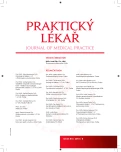Dysphagia associated with neurological disorders
Authors:
M. Vališ 1; L. Šimůnek 1; Viktor Chrobok 2
; Z. Pavelek 1; Michal Černý 2
; E. Ehler 3; P. Kunc 1
Authors‘ workplace:
Univerzita Karlova v Praze, Lékařská fakulta a Fakultní nemocnice Hradec Králové
; Neurologická klinika
Přednosta: doc. MUDr. Martin Vališ, Ph. D.
1; Klinika otorinolaryngologie a chirurgie hlavy a krku
Přednosta: prof. MUDr. Viktor Chrobok, CSc., Ph. D.
2; Univerzita Pardubice, Fakulta zdravotnických studií
Krajská nemocnice Pardubice, a. s., Neurologická klinika
Přednosta: doc. MUDr. Edvard Ehler, CSc.
3
Published in:
Prakt. Lék. 2014; 94(6): 254-258
Category:
Various Specialization
Overview
A swallowing disorder, also known as dysphagia, is usually a consequence or a complication of other diseases. An incorrect appraisal of swallowing function can give rise to an aspiration and a risk of death. It can also result in deterioration in a state of health because of malnutrition and dehydration. In the introduction of this article there is described a correct course of the act of swallowing and an elementary classification of swallowing disorders. This article deals with dysphagia in neurological disorders. There are discussed causes and appropriate treatment of swallowing problems in strokes, amyotrophic lateral sclerosis, Parkinson’s disease, Alzheimer’s disease, multiple sclerosis, myasthenia gravis, Guillain-Barré syndrome, muscular dystrophies and inflammatory myopathies.
Keywords:
dysphagia – swallowing act – logopaedics – aspiration
Sources
1. Adams C. Complications and causes of death in multiple sclerosis. In Adams C, et al. Colour atlas of multiple sclerosis and other myelin disorders. London: Wolfe Medical Publications Ltd., 1989; 202–208.
2. Ali GN, Wallace KL, Schwartz R, et al. Mechanisms of oral-pharyngeal dysphagia in patients with Parkinson’s disease. Gastroenterology 1996; 10(2): 383–392.
3. Blass JP. Pathyphysiology of Alzheimer’s syndrome. Neurology 1993; 43(Suppl 4): 25–38.
4. Borasio GD, Voltz R. Palliative care in amyotrophic lateral sclerosis. J Neurol 1997; 244(4): 11–17.
5. Born LJ, Harned RH, Rikkers LF, et al. Cricopharyngeal dysfunction in Parkinson’s disease: role in dysphagia and response to myotomy. Mov Disord 1996; 1(1): 53–58.
6. Byrne KG, Pfeiffer R, Quigley EM. Gastrointestinal dysfunction in Parkinson’s disease. A report of clinical experience at a single center. J Clin Gastroenterol 1994; 19(1): 11–16.
7. Coates C, Bakheit AM. Dysphagia in Parkinson’s disease. Eur Neurol 1997; 38(1): 49–52.
8. El Sharkawi A, Ramig L, Logemann J, et al. Swallowing and voice effects of Lee Silverman voice treatment: a pilot study. J Neurol Neurosurg Psychiatry 2002; 72(1): 31–36.
9. Ertekin C, Yuceyar N, Aydogdu I. Clinical and electrophysiological evaluation of dysphagia in myasthenia gravis. J Neurol Neurosurg Psychiatry 1998; 65 : 848–856.
10. Grofová Z. Výživa u poruch polykání. Med. Pro Praxi 2008; 5(10): 399–400.
11. Horner J, Alberts MJ, Dawson DV, Cook GM. Swallowing in Alzheimer’s disease. Alzheimer Dis Assoc Disord 1994; 8(3): 177–189.
12. Hunter PC, Crameri J, Austin S, et al. Response of parkinsonian swallowing dysfunction to dopaminergic stimulation. J Neurol Neurosurg Psychiatry 1997; 63 : 579–583.
13. Iwasaki K, Wang Q, Seki H, et al. The effects of the traditional chinese medicine „Banxia Houpo Tang (Hange-Koboku To)“ on the swallowing reflex in Parkinson’s disease. Phytomedicine 2000; 7(4): 259–263.
14. Martino R, Foley N, Bhogal S, et al. Dysphagia after stroke: incidence, diagnosis, and pulmonary complications. Stroke 2005; 36(12): 2756–2763.
15. Piťha J, Bednařík J, Zapletalová O. Klinický standard pro diagnostiku a léčbu myasthenia gravis. 1. vyd. Edice Národní sada klinických standardů. Praha: Národní referenční centrum 2011.
16. Prosiegel M, Schelling A, Wagner-Sonntag E. Dysphagia and multiple sclerosis. Int MS J 2004; 11(1): 22–31.
17. Roy N, Stemple J, Merrill R, Thomas L. Dysphagia in the elderly: preliminary evidence of prevalence, risk factors, and socioemotional effects. Ann Otol Rhinol Laryngol 2007; 116(11): 858–865.
18. Smith HA, Lee SH, O’Neill PA, Connolly MJ. The combination of bedside swallowing assessment and oxygen saturation monitoring of swallowing in acute stroke: a safe and humane screening tool. Age Ageing 2000; 29(6): 495–499.
19. Thomas FJ, Wiles CM. Dysphagia and nutritional status in multiple sclerosis. J Neurol 1999; 246(8): 677–682.
20. Volicer L, Seltzer B, Rheaume Y, et al. Progression of Alzheimer-type dementia in instituonalized patients: a cross-sectional study. J Appl Gerontol 1987; 6 : 83–94.
Labels
General practitioner for children and adolescents General practitioner for adultsArticle was published in
General Practitioner

2014 Issue 6
- Advances in the Treatment of Myasthenia Gravis on the Horizon
- Hope Awakens with Early Diagnosis of Parkinson's Disease Based on Skin Odor
- Memantine in Dementia Therapy – Current Findings and Possible Future Applications
- Memantine Eases Daily Life for Patients and Caregivers
- Possibilities of Using Metamizole in the Treatment of Acute Primary Headaches
-
All articles in this issue
- Idiopathic orbital pseudotumour
- Myocardial infarction as the first symptom of essential thrombocythemia in a young man
- Dysphagia associated with neurological disorders
-
Vaccination and its role in prevention of infectious diseases.
A vaccination refusal – a serious problem of public health - Occupational diseases reported in the Czech Republic in 2013
- Patient’s safety at operating theatre in Czech and Swedish hospitals
- Introduction to medical ethics – how to understand Hippocratic tradition today
- General Practitioner
- Journal archive
- Current issue
- About the journal
Most read in this issue
- Dysphagia associated with neurological disorders
- Idiopathic orbital pseudotumour
- Patient’s safety at operating theatre in Czech and Swedish hospitals
-
Vaccination and its role in prevention of infectious diseases.
A vaccination refusal – a serious problem of public health
